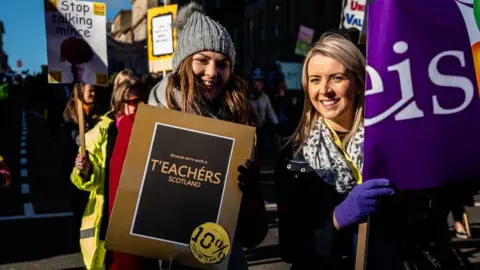Vast majority of Scottish schools to close during strike
 Getty Images
Getty ImagesAlmost all of Scotland's schools are expected to be closed if a teachers' strike goes ahead next Thursday.
Every state secondary school in the country is currently due to shut during the 24-hour strike by EIS members in a dispute over pay.
Only Orkney and Shetland councils expect to be able to keep some of their primary schools open.
The EIS is by far the country's biggest teaching union, and represents about 80% of teachers.
The AHDS union, which represents some heads and deputes, is also striking.
The unions have rejected a 5% pay increase, saying they want 10% to reflect the cost of living crisis and rising inflation.
The EIS has said its members in primary schools will hold another strike on 10 January, with teachers in secondary schools striking the next day.
Teachers are employed by councils, who get much of their money from the Scottish government, but their pay and conditions are the same across the country.
Pay deals are negotiated at a committee which brings together unions, councils and the Scottish government.
No new pay offer was made at a meeting of the committee on Thursday afternoon.
If the dispute is not resolved the SSTA union, which represents many secondary school teachers, plans to strike in the week beginning 5 December, with the exact date still to be confirmed.
The Scottish government has argued that any improved pay offer would mean tough spending decisions elsewhere.
The last national strike by teachers in Scotland over pay was in the mid-1980s.
During that strike, it was rare for schools to close completely. Students could still attend for lessons with teachers who were members of other unions.
Councils have also been confirming their arrangements for pupils who are entitled to free school meals.
School dining halls will be closed but councils are planning to make payments to the parents or guardians of those in receipt of free meals, although the details vary across the country.


Time is running out to prevent a teachers' strike on Thursday.
The EIS knows the mere threat of a national strike is something of a nuclear option. It hopes the prospect will lead to an improved pay offer.
The union remains hopeful that a new pay offer will be made before the strike takes place although, as of Friday afternoon, no further meetings of the committee where pay is negotiated are in the diary.
It is now clear that if the strike does go ahead, the disruption will be massive. Pupils will be at home and the parents of some children may need to work from home or make childcare arrangements.
If a strike happens, the union will see it as a last resort.
But can a significantly improved pay offer be made?
Councils get much of their money from the Scottish government and regularly highlight their difficult financial situation. The government, in turn, is at pains to argue that any improved pay offers will mean hard choices elsewhere.
There is also the question of how other council workers might feel if teachers were offered a bigger cost of living rise than them.
Thursday's strike is still not inevitable but a deal which might lead to it being called off will not be easy to achieve.
